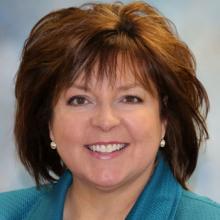Each month, the AMA highlights institutions that are part of the AMA Accelerating Change in Medical Education Consortium to showcase their work with the consortium and innovations in medical education.
Featured institution and leadership
Susan Enright, DO, FACOI
Assistant dean for clerkship education
Michigan State University College of Osteopathic Medicine
Number of years in the consortium: 6 years
What are your Accelerating Change in Medical Education project and goals?
Our health systems science (HSS) curriculum continues to evolve as we Plan-Do-Check-Act. To provide a broader curriculum this year in HSS, we utilized the AMA HSS Modules, combined with a prepared faculty discussion-led document and additional short videos to support the module topics. The students reviewed an assigned AMA module prior to the didactic session. When meeting in person or virtually, the faculty member led discussions on the topic by following the faculty guide discussion suggestions.
As a distributive model in our clinical clerkship years, the faculty guide was an important step for the delivery of consistent education across our affiliated institutions. Recent participation in the HSS Thematic Meeting and the HSS Scholars programs, improvements are already underway for next year. We will be utilizing small group activities combined with the discussion to test knowledge as well as application of the concepts within HSS.
Our hopes are to continue to refine and improve the delivery of these important topics to maximize student interest in medical school and beyond.
How has your work as a member of the Accelerating Change in Medical Education Consortium prepared you to respond to disruptions related to COVID-19?
The ability to be part of the AMA Accelerating Change in Medical Education Consortium has been priceless. We have had the opportunity to learn from others in the struggles and successes of curriculum delivery and in day-to-day operations via networking.
What do you think will change about medical education in the next five years?
I believe we will see an expanded outcomes curriculum for the undergraduate medical education (UME) community that will eventually have similar language to graduate medical education. The UME community will have to adopt this effectively, efficiently and transparently.
Can you share some strategies to maintain team engagement and well-being in this challenging time?
Our team engagement has been significantly improved by the institution of team huddles on a very regular basis. At the onset of COVID, our huddles were daily. We have been able to decrease them to three times a week. Being virtual has allowed this gathering—where we discuss daily activities, needed tasks, and where the team needs to chip in to help other teammates—to be effective.
The huddles have also provided a platform for our team to socialize, laugh and meet each other’s families, including our 4-legged friends. We would otherwise not have had that chance. Working virtually has allowed increased flexibility in scheduling for our team, which also increases well-being.




